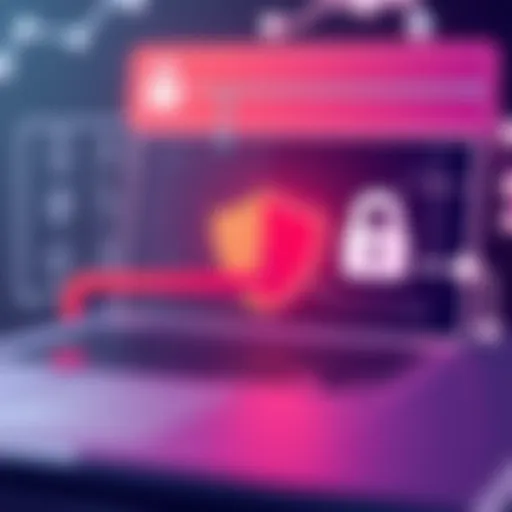Safeguarding Personal Information: Unveiling Top Identity Theft Protection Measures


Cybersecurity Threats and Trends
In the realm of cybersecurity threats and trends, it is imperative to stay abreast of the ever-evolving landscape of digital vulnerabilities. From sophisticated phishing schemes to ransomware attacks, individuals and businesses face a myriad of risks in the digital sphere. These cyber threats not only jeopardize sensitive personal information but also pose significant financial and reputational implications.
Best Practices for Cybersecurity
When it comes to safeguarding personal data from cyber threats, adopting robust cybersecurity practices is paramount. Strong password management strategies, such as using complex alphanumeric combinations and avoiding password reuse, can fortify digital defenses. Incorporating multi-factor authentication adds an extra layer of security, mitigating the risk of unauthorized access to confidential information. Regularly updating software and applying security patches play a crucial role in addressing potential vulnerabilities that cybercriminals could exploit. Additionally, cultivating secure online browsing habits and exercising caution with email communications can help prevent falling victim to malware and phishing attacks.
Privacy and Data Protection
Privacy and data protection are fundamental elements in the fight against identity theft. Implementing data encryption tools can shield sensitive information from prying eyes, safeguarding it against unauthorized interception. Awareness of the risks associated with sharing personal details online is key to minimizing exposure to potential threats. Employing strategies to secure sensitive data, such as utilizing secure cloud storage solutions and implementing privacy settings on social media platforms, can bolster individuals' defenses against privacy breaches.
Security Technologies and Tools
Familiarizing oneself with key cybersecurity tools and software is essential in building a robust defense system against cyber threats. Antivirus programs and firewalls are indispensable in detecting and repelling malicious software, ensuring the integrity of digital assets. Virtual Private Networks (VPNs) offer an additional layer of security by encrypting data transmissions, particularly when accessing public Wi-Fi networks.
Cybersecurity Awareness and Education
Enhancing cybersecurity awareness and education is pivotal in empowering individuals to recognize and respond to potential threats proactively. Educating individuals on identifying phishing attempts and fraudulent schemes can significantly reduce the likelihood of falling prey to cybercriminal tactics. Promoting cybersecurity awareness in the digital age fosters a culture of vigilance and resilience against evolving cyber threats. Equipping oneself with resources on cybersecurity fundamentals, whether through online courses, seminars, or informative websites, can enhance one's knowledge base and aptitude in navigating the complex landscape of digital security.
Understanding Identity Theft


Identity theft is a pervasive issue in today's digital landscape. It is crucial to comprehend the intricacies of this threat to effectively counteract it. By understanding the nuances of identity theft, individuals can protect themselves from malicious actors seeking to exploit their personal information. This section will delve into the various dimensions of identity theft, shedding light on its impact and implications for individuals in the modern age.
Defining Identity Theft
Identity theft is the unauthorized acquisition and use of an individual's personal data for illicit purposes. It encompasses a range of fraudulent activities, such as financial fraud, impersonation, and data breaches. Understanding the definition of identity theft is the first step towards implementing robust protective measures to safeguard personal information.
Types of Identity Theft
Financial Identity Theft
Financial identity theft involves the unauthorized use of financial information to conduct fraudulent transactions. This form of theft can result in significant financial losses and damage to an individual's credit score. Understanding the intricacies of financial identity theft is crucial for individuals to fortify their financial security and prevent potential monetary harm.
Criminal Identity Theft
Criminal identity theft occurs when a criminal assumes another individual's identity to evade law enforcement or perpetrate criminal activities. This type of theft can lead to severe legal implications for the victim, ranging from wrongful accusations to criminal records. Recognizing the challenges posed by criminal identity theft is essential in mitigating its adverse effects on individuals.
Medical Identity Theft
Medical identity theft involves the misuse of personal health information to obtain medical services, prescriptions, or insurance coverage under false pretenses. This form of theft can compromise an individual's medical history, leading to inaccuracies in their medical records and potentially endangering their health. Being aware of the risks associated with medical identity theft is crucial for maintaining the integrity of one's medical information and ensuring proper healthcare delivery.
Impact of Identity Theft
Identity theft can have far-reaching consequences, impacting victims financially, emotionally, and even physically. The aftermath of identity theft can result in extensive financial losses, damaged reputations, and prolonged legal battles to restore one's identity. Understanding the profound implications of identity theft underscores the importance of implementing proactive protection measures to prevent such incidents and safeguard personal information.


Key Strategies for Identity Theft Protection
In the relentless world of digital crimes, safeguarding personal information stands paramount, making Key Strategies for Identity Theft Protection a crucial focus of this enlightening discourse. Implementing robust security measures isn't just a recommendation; it's a necessity in today's cyber landscape where threats loom large. The significance of fortifying one's defenses against identity theft cannot be overstated. By instilling a culture of vigilance and proactive protection, individuals can mitigate risks and ensure the safety of their sensitive data.
Implementing Strong Password Practices
One pivotal pillar in the bastion against identity theft is the utilization of strong password practices. Crafty cybercriminals are adept at exploiting weak passwords to gain unauthorized access to personal accounts, often leading to disastrous consequences. By creating complex and unique passwords for different accounts, individuals can significantly bolster their security posture. Implementing practices such as using a combination of letters, numbers, and special characters, as well as regularly updating passwords, enhances resilience against malicious attacks.
Utilizing Multi-Factor Authentication
Beyond passwords lies the realm of multi-factor authentication, a potent tool in the arsenal of identity protection strategies. By adding an extra layer of security, multi-factor authentication thwarts unauthorized access even if passwords are compromised. This additional verification step, often requiring a code sent to a trusted device, adds an invaluable shield against cyber intruders. Embracing multi-factor authentication fortifies defenses and acts as a robust safeguard for personal data.
Regularly Monitoring Financial Accounts
Vigilance is imperative in the battle against identity theft, and regularly monitoring financial accounts serves as a critical defensive strategy. By actively scrutinizing bank statements, credit card transactions, and other financial activities, individuals can swiftly pinpoint any irregularities or suspicious behavior. Early detection of fraudulent activities empowers individuals to take prompt action and mitigate potential damages effectively.
Securing Personal Devices
In an interconnected digital ecosystem, securing personal devices plays an instrumental role in safeguarding sensitive information. Ensuring devices are equipped with strong encryption, up-to-date security software, and activating features like remote wipe capabilities can bolster defenses against unauthorized access. By maintaining a proactive stance on device security, individuals can fortify their digital fortresses and thwart attempts of data breaches and cyber intrusions.
Advanced Measures for Enhanced Protection


In the digital landscape rife with malicious actors and sophisticated cyber threats, adopting advanced measures for enhanced protection is crucial to fortifying one's defenses against identity theft. This section delves into the significance of bolstering security measures beyond the basics, delving deeper into safeguarding personal information. Advanced measures encompass a range of strategies and techniques designed to mitigate risks and proactively shield individuals from falling victim to identity theft.
Enrolling in Identity Theft Protection Services
For individuals seeking a proactive approach to shield themselves from the ever-evolving landscape of identity theft, enrolling in specialized identity theft protection services emerges as a formidable line of defense. These services offer a comprehensive suite of tools and resources tailored to detect, prevent, and mitigate potential threats to personal information. By entrusting professionals and advanced algorithms to monitor for suspicious activities and swiftly respond to potential breaches, individuals can rest assured that their data is under vigilant protection.
Freezing Credit Reports
Freezing credit reports stands out as a potent tactic in safeguarding one's financial well-being and personal information. By freezing credit reports, individuals can restrict unauthorized access to their credit history, thwarting potential fraudsters from opening accounts or obtaining credit in their name. This preventive measure imposes a lock on credit files, necessitating explicit permission from the individual to unfreeze them, enhancing control over who can view or utilize sensitive financial data.
Regularly Checking Credit Reports
Consistent monitoring of credit reports plays a pivotal role in identifying any anomalous activity or discrepancies that may signal identity theft. By proactively reviewing credit reports on a regular basis, individuals can promptly detect unauthorized transactions, unfamiliar accounts, or erroneous information that could indicate fraudulent behavior. This practice empowers individuals to swiftly intervene in the event of suspicious activity, enabling them to take timely action to mitigate potential damages and protect their financial standing.
Educational Resources on Identity Theft
In the digital age, the significance of educational resources on identity theft cannot be overstated. These resources serve as essential tools to equip individuals with the knowledge and skills needed to combat the ever-evolving threats to personal information security. By delving into educational materials, individuals can gain insights into the latest trends in cyber threats, understanding how to protect sensitive data effectively. Moreover, educational resources offer guidance on responding to potential breaches and preemptive measures to strengthen one's security posture. By integrating educational resources into their practices, individuals can enhance their awareness and resilience against identity theft.
Cybersecurity Blogs and Websites
Cybersecurity blogs and websites play a pivotal role in disseminating valuable information on identity theft and cybersecurity best practices. These platforms serve as hubs for industry updates, expert insights, and practical tips on safeguarding personal information. Individuals can leverage cybersecurity blogs and websites to stay informed about new threat vectors, emerging scams, and effective defense strategies. By following reputable blogs and websites dedicated to cybersecurity, individuals can fortify their knowledge base, stay ahead of potential threats, and adopt proactive security measures to mitigate risks effectively.
Identity Theft Awareness Programs
Identity theft awareness programs are instrumental in fostering a proactive stance against cyber threats and fraudulent activities. These programs aim to educate individuals about the various forms of identity theft, common tactics employed by fraudsters, and the impact of compromised personal information. By participating in identity theft awareness programs, individuals can enhance their ability to identify potential risks, detect early warning signs of identity theft, and take prompt action to mitigate potential damages. Additionally, these programs offer practical advice on securing personal data, navigating online transactions securely, and responding to suspicious activities. By engaging with identity theft awareness programs, individuals can cultivate a culture of vigilance and resilience in safeguarding their identities.
Online Courses on Data Security
Online courses on data security provide a structured learning environment for individuals seeking comprehensive knowledge and skills in protecting sensitive information. These courses cover a range of topics, including encryption techniques, network security protocols, risk assessment strategies, and incident response procedures. By enrolling in online courses on data security, individuals can deepen their understanding of cybersecurity principles, refine their data protection practices, and stay abreast of industry best practices. Furthermore, online courses offer interactive modules, case studies, and assessments to reinforce learning outcomes and enable practical application of security concepts. Through online courses on data security, individuals can elevate their expertise, bolster their defense mechanisms, and proactively safeguard their data assets.







